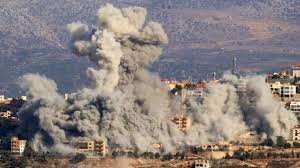Search This Blog
A space for a deeper understanding of the world from a global Arab perspective. A blog that highlights the complexities of the Arab world within a global context.
Featured
- Get link
- X
- Other Apps
The Suppressed colonialism- Germany's position on the Gaza massacre. The guilt complex is not the only motivation.
In March 2008, Angela Merkel addressed the Knesset to mark the sixtieth anniversary of the founding of the Israeli state. It declared that support for Israel was the raison d'être of the German Federal Republic, or what it called in German Staatsräson, which was introduced as a doctrine of German foreign policy.
The statement seems shocking even to the majority of German citizens themselves, who do not share with Mrs. Merkel or her successor Olaf Scholz that the reason for their political and national meeting is to protect a foreign country, whatever it may be.
It was soon after the events of October 7 that Germany announced that it would freeze its funding for the United Nations Relief and Works Agency for Palestine Refugees (UNRWA). Under the influence of the German model, the EU and Switzerland have taken similar steps to freeze funding for several Palestinian non-profit organizations, including UNRWA.
Matthias Dopfner, CEO of the company that owns Bild, criticized UN Secretary-General António Guterres and Swedish environmental activist Greta Thunberg for supporting the Palestinians' right to life, saying that when it comes to supporting Israel, "there is no yes, but."
Dubenfens points out that Israel's support must be blind and mute, not conditional, demanded or criticized. German Vice Chancellor Robert Habecke, one of the most prominent figures in the Green Party, accused the anti-Israel demonstrators of turning against Germany's values and adopting a "narrative of great resistance." Habeck views any call to resist any Israeli action as contrary to German values, and called on the police to forcefully confront the protesters, even if it leads to forcible transfer.
The German newspaper Bild provided video coverage of the prisoner exchange between Palestinians and Israelis in two opposite photos; the first is angelic showing an Israeli family reunited after the return of its members from captivity, with the caption "Israeli fathers embrace in peace their released children."
The opposite scene was the necessary antithesis of the embodiment of evil in a scene akin to the caricatured conflicts of good and evil in the imaginations of low-talented authors. Bild presented a diabolical image of Palestinian celebrants celebrating the release of their prisoners under the headline "Release of Palestinian terrorist," and the newspaper commented that the difference was significant.
In a fairer world, that speech might have been considered a hate crime based on race and national background, but publishing it in a well-known newspaper like Bild and passing without even commenting meant that something was rotten in the German elites and that Germany was facing a complex crisis.
The issue seems more complicated than the answer to Germany's guilt complex towards the Jews, the issue has gone beyond the first guilt towards the Jews to prepare the collective mind for another sin towards the Arabs, including stereotyping and demonizing them and the police abuse of residents if necessary, as called for by the German Vice Chancellor. While one party is demonized and dehumanized in a public media and political discourse, another is sanctified and immune from criticism.
Germany and several other European countries suffer, but Germany remains the most famous model, from what we might call the "repressed colonialism" complex, that is, a colonial spirit that cannot express itself or appear crudely in public due to the vicissitudes of time or a previous colonial defeat. A soul waiting for the opportunity to rears its head in the crises of the struggle of the oppressed poor with the rich colonizers.
The struggles of those who have power with those who do not have it are the same spirit that sees the terrorist in certain contexts. In these contexts, a terrorist is always one who does not have a modern tank, advanced aircraft or organized military force, even if he is defending his occupied territory in accordance with the UN resolution. Or defend their right to the same life without being suffocated by a chronic blockade from which there is no safe way out.
However, these foundations were greatly defeated in World War II, when they went to other Europeans, and prevented this spirit from coming out publicly, but its impact and attempts to get out continued in a safer and less dangerous form. So they take advantage of easy, low-cost visibility opportunities. Nothing is easier than the Palestinian blood concerts that Israel's energetic colonial spirit holds every once in a while, and it goes beyond guilt to the necessary alliance of the parties: an alliance of old colonialism with neo-colonialism that supports each other.
While the guilt of the German Holocaust during World War II, whose victims were mostly Jews and Roma (Roma) peoples, cannot be denied, guilt alone cannot explain all this aggression.
The Gaza crisis represents an opportunity for the ruling class in Germany (and perhaps Europe) to express the repressed colonial self and the repressed aggressive spirit that has established the state itself in the German case since the first unification (1871) or the second reich.
Germany's humiliating defeat in World War II has severely suppressed it, but it remains a ghost in the background waiting for an opportunity to rear. Some nations seem faithful to their first roots, even if they have accumulated historical layers of major defeats and forced changes, but they quickly return to their first path whenever opportunities arise.
- Get link
- X
- Other Apps



Comments
Post a Comment